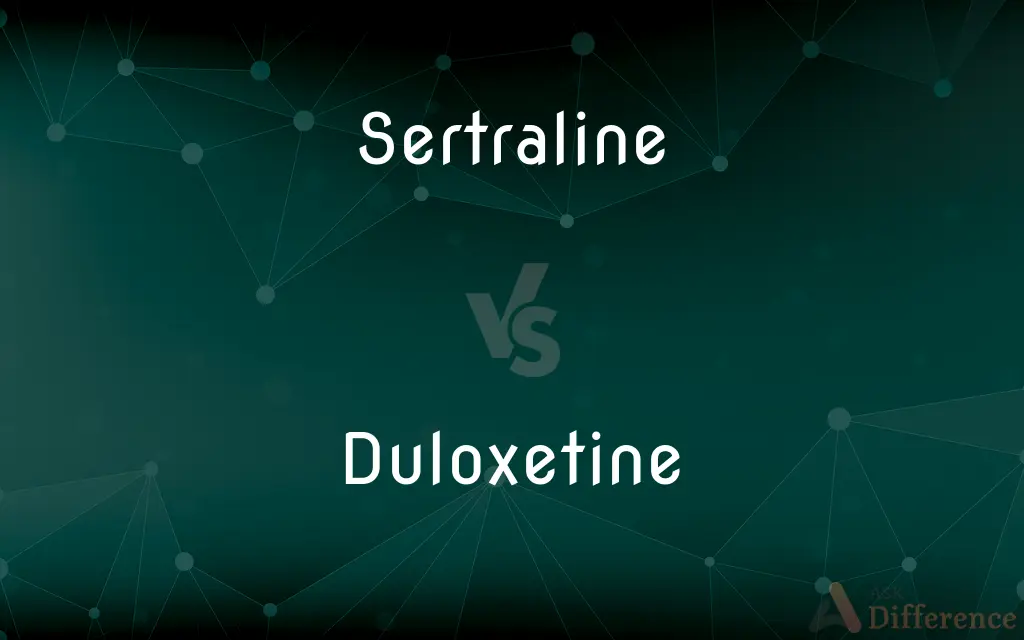Sertraline vs. Duloxetine — What's the Difference?
By Tayyaba Rehman & Maham Liaqat — Updated on April 4, 2024
Sertraline is an SSRI used primarily for depression and anxiety, focusing on serotonin reuptake inhibition, while Duloxetine, an SNRI, targets both serotonin and norepinephrine reuptake, broadening its use to include pain management.

Difference Between Sertraline and Duloxetine
Table of Contents
ADVERTISEMENT
Key Differences
Sertraline works by selectively inhibiting the reuptake of serotonin, a neurotransmitter associated with mood regulation. This mechanism is particularly effective in treating depression and various anxiety disorders by increasing serotonin levels in the brain. Conversely, Duloxetine functions by inhibiting the reuptake of both serotonin and norepinephrine, another neurotransmitter involved in mood and pain perception. This dual action makes Duloxetine effective not only for depressive and anxiety disorders but also for chronic pain conditions, such as fibromyalgia and neuropathic pain associated with diabetes.
In terms of side effects, Sertraline is generally well-tolerated, with common side effects including nausea, headaches, and insomnia. These are typical of SSRIs, reflecting Sertraline's specific action on serotonin pathways. Duloxetine, due to its broader mechanism of action, may cause similar side effects but also includes increased blood pressure and dizziness, particularly because of its effect on norepinephrine.
Sertraline is often considered a first-line treatment for depression and anxiety disorders due to its efficacy and safety profile. Its focused action on serotonin reuptake makes it a preferred option for patients with primarily mood-related symptoms. Duloxetine, with its additional action on norepinephrine, is preferred when treatment also requires pain management, making it a versatile choice for patients with co-occurring depressive symptoms and chronic pain.
The decision between Sertraline and Duloxetine often depends on the individual's specific symptoms and medical history. For instance, Sertraline might be more suitable for individuals solely with depression or anxiety, while Duloxetine might be chosen for its additional benefits in treating pain symptoms alongside mood disorders.
Despite their differences, both medications require time to show efficacy, typically several weeks, and both necessitate careful monitoring by healthcare professionals to adjust dosages and manage side effects. They also share the need for gradual discontinuation to avoid withdrawal symptoms, emphasizing the importance of medical guidance in their use.
ADVERTISEMENT
Comparison Chart
Class
Selective Serotonin Reuptake Inhibitor (SSRI)
Serotonin and Norepinephrine Reuptake Inhibitor (SNRI)
Primary Use
Depression and anxiety disorders
Depression, anxiety disorders, and chronic pain management
Mechanism of Action
Inhibits serotonin reuptake
Inhibits serotonin and norepinephrine reuptake
Common Side Effects
Nausea, headaches, insomnia
Nausea, headaches, insomnia, increased blood pressure, dizziness
Unique Benefits
Preferred for mood-related symptoms
Effective for both mood symptoms and pain management
Compare with Definitions
Sertraline
Requires gradual discontinuation to avoid withdrawal.
Patients are advised to taper off Sertraline slowly under medical supervision.
Duloxetine
An SNRI effective for depression, anxiety, and pain.
Duloxetine is prescribed for diabetic neuropathy pain as well as for depression.
Sertraline
Generally well-tolerated with manageable side effects.
Most people on Sertraline experience mild side effects that diminish over time.
Duloxetine
Inhibits both serotonin and norepinephrine reuptake.
The dual action of Duloxetine can lead to improved mood and pain relief.
Sertraline
An SSRI used for treating depression and anxiety.
A patient with panic disorder might be prescribed Sertraline to help manage symptoms.
Duloxetine
Also requires careful discontinuation planning.
Like Sertraline, stopping Duloxetine suddenly can lead to withdrawal symptoms.
Sertraline
Works by increasing serotonin levels in the brain.
By taking Sertraline, individuals may experience improved mood and decreased anxiety.
Duloxetine
Offers pain management benefits in addition to mood improvement.
Duloxetine is beneficial for conditions like fibromyalgia.
Sertraline
Considered a first-line treatment for mood disorders.
Doctors often prescribe Sertraline as an initial treatment for depression.
Duloxetine
Can cause increased blood pressure as a side effect.
Patients on Duloxetine are monitored for changes in blood pressure.
Sertraline
Sertraline, sold under the brand name Zoloft among others, is an antidepressant of the selective serotonin reuptake inhibitor (SSRI) class. The efficacy of sertraline for depression is similar to that of other antidepressants, and the differences are mostly confined to side effects.
Duloxetine
A drug of the SNRI class, C18H19NOS, used in its hydrochloride form to treat depression, anxiety, fibromyalgia, and diabetic neuropathy.
Sertraline
A drug of the SSRI class, C17H17Cl2 N, used in its hydrochloride form primarily to treat depression, obsessive-compulsive disorder, posttraumatic stress disorder, and anxiety.
Duloxetine
(pharmaceutical drug) A drug that functions as an SNRI and is administered orally in the form of its hydrochloride C18H19NOS·HCl especially to treat depression, anxiety, and chronic pain (such as that associated with fibromyalgia and peripheral neuropathy). It is marketed under the trademark Cymbalta.
Sertraline
(pharmaceutical drug) An antidepressant drug C17H17NCl2 administered in the form of its hydrochloride and acting to enhance serotonin activity.
Sertraline
A selective-serotonin reuptake inhibitor commonly prescribed as an antidepressant (trade name Zoloft)
Common Curiosities
How does Duloxetine work?
Duloxetine works by inhibiting the reuptake of both serotonin and norepinephrine, helping manage mood disorders and chronic pain.
Can Sertraline be used for pain management?
Sertraline is mainly effective for mood disorders; it's not typically used for pain management like Duloxetine.
Is it safe to suddenly stop taking Sertraline or Duloxetine?
No, both medications require gradual tapering to avoid withdrawal symptoms, under the guidance of a healthcare professional.
What should be considered when choosing between Sertraline and Duloxetine?
Considerations include specific symptoms (e.g., presence of pain), side effect profiles, and individual medical history.
Can Duloxetine treat anxiety as effectively as Sertraline?
Yes, Duloxetine is effective for treating anxiety disorders, in addition to depression and chronic pain.
How do healthcare providers decide which medication to prescribe?
Decisions are based on the patient's specific symptoms, side effect tolerance, medical history, and response to previous treatments.
How long does it take for Sertraline and Duloxetine to work?
It can take several weeks to notice the full benefits of both Sertraline and Duloxetine.
Can either medication cause weight gain?
Weight changes can occur with both medications, though individual experiences vary widely.
Can these medications be taken together?
Taking Sertraline and Duloxetine together is not recommended due to the risk of serotonin syndrome. Always consult a healthcare professional.
What is Sertraline primarily used for?
Sertraline is primarily used for treating depression and anxiety disorders by increasing serotonin levels in the brain.
Are there any conditions where Duloxetine is preferred over Sertraline?
Duloxetine is preferred when treatment needs to address both mood disorders and chronic pain conditions.
How does the dual action of Duloxetine benefit patients with chronic pain?
Duloxetine's effect on both serotonin and norepinephrine can lead to mood improvement and significant pain reduction, particularly in neuropathic and fibromyalgia patients.
Are there any dietary restrictions with Sertraline or Duloxetine?
While there are no specific dietary restrictions, it's important to discuss all medications and supplements with a healthcare provider to avoid interactions.
Share Your Discovery

Previous Comparison
Notorious vs. Naughty
Next Comparison
Bark vs. StemAuthor Spotlight
Written by
Tayyaba RehmanTayyaba Rehman is a distinguished writer, currently serving as a primary contributor to askdifference.com. As a researcher in semantics and etymology, Tayyaba's passion for the complexity of languages and their distinctions has found a perfect home on the platform. Tayyaba delves into the intricacies of language, distinguishing between commonly confused words and phrases, thereby providing clarity for readers worldwide.
Co-written by
Maham Liaqat













































